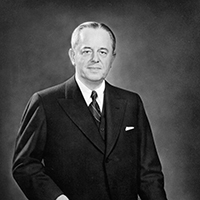 Undergrad mentors in the Krannert Leadership Development (KLD) program assist their mentees in getting acquainted with life at Purdue and help set them on a path for success. (Photo provided)
Undergrad mentors in the Krannert Leadership Development (KLD) program assist their mentees in getting acquainted with life at Purdue and help set them on a path for success. (Photo provided)
Learning in Tandem
Today’s students mentoring tomorrow’s leaders
Christine Jackson, associate professor of management, understands how people learn — or more specifically, how people learn together. As director of the Krannert Leadership Development (KLD) program, she’s now using that knowledge to transform the student experience.
The program is all about relationships — personal and professional — and encouraging incoming students to begin considering their futures from the first week of classes. Jackson has built KLD with an emphasis on mentoring, but stresses that it isn’t just about having someone to talk to, but also having someone who can be a personal coach.
The program’s name was developed by students and gives a purposeful look at its mission, Jackson says.
“They chose the name because the program is centered on today’s leaders developing tomorrow’s leaders,” she says. “It isn’t just about helping students have a smooth transition into college, but providing support and resources for students so they can really excel when they get here, both academically and beyond the classroom.”
Bridging the gap
The undergraduate mentoring program was developed to fill what Jackson saw as a gap. In her almost 10 years at Purdue, she had found many students who excelled academically but missed the boat on getting involved with the Purdue community and all of its development opportunities. She saw an undergraduate mentoring program as a chance to get students involved from the beginning.
“There is absolutely no reason first-year Krannert students should not have resumes that they are proud of and can use to obtain an internship as early as possible. I wanted them to network, develop relationships, build confidence and feel welcome in the Krannert community, whether by joining student organizations, volunteering, or participating in case competitions and study abroad programs,” she says.
Her hard work, coupled with student enthusiasm and “many hours” of advising office support led by Jenna Wargo, senior undergraduate advisor, has doubled the program’s size in two years. In 2014, the undergraduate program had 80 mentors and 126 mentees. But Jackson still isn’t satisfied. She hopes to increase the reach to 160 undergraduate mentees by the 2015-16 academic year by giving each mentor responsibility for two mentees.
Among them is Young Zhuang, who as a senior this fall will become one of four head undergraduate mentors along with Austin Blessinger, Jefferson Trippel and Danielle Pappas. “The mentees really get adapted to college at a much quicker pace,” Zhuang says. “They are assimilated into the Krannert culture early on, which is a reason why their development as leaders will be more probable. This guidance provides them a strong base from someone who has gone through the ropes and is able to lead them to success on campus.”
This touches on the immense value in the program to mentees, but there is another visible perk that Jackson didn’t entirely expect — the benefit to mentors.
As Zhuang explains, “The most important benefits for mentors are teaching and cultivating young talent to become successful undergraduates. Words can simply not describe how happy a mentor can be when they see a mentee grow. Especially when this growth occurs much faster and earlier than similar underclassman who have not had this mentoring benefit given to them.”
The program is always evolving under Jackson’s hand. She is beginning to see mentees from two years ago applying to be mentors, so it is now coming full circle.
“I think as the program grows we will utilize more past mentees as mentors so they get that full growth experience,” she says. “One of the goals is to have that kind of endless population to build the program.”






